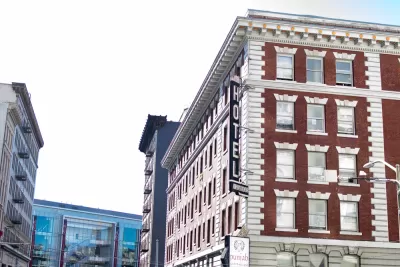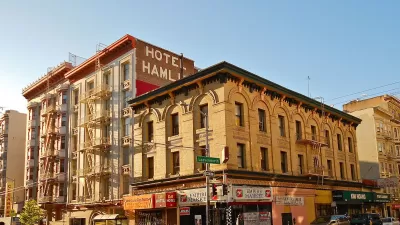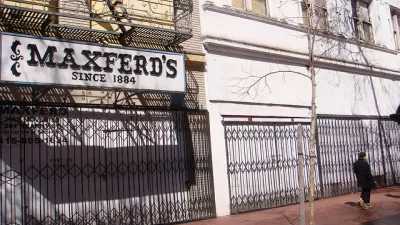With COVID-19 assistance programs expiring, tenants of the city’s single-room occupancy hotels face growing eviction rates. Many of them have nowhere to go but back on the street.

Residents of San Francisco’s single-room occupancy hotels (SROs), many of whom depend on the city-funded housing to stay out of homelessness, are getting evicted at higher rates as pandemic-era assistance programs lapse, report Joaquin Palomino and Trisha Thadani of the San Francisco Chronicle. According to the article, at least 114 people were evicted in the last fiscal year, compared to 40 in the previous years. “The Chronicle found that more than half of all evictions were in nine residential hotels, which housed 16% of all supportive housing SRO residents.”
The authors point out that these numbers belie the true extent of the city’s housing crisis, and that many tenants are forced out through unofficial means not recorded by HSH. “For example, some residents sign agreements with property managers, promising to leave by a certain date in order to keep the eviction off the books and preserve their housing record.”
The authors note that “The nonprofits that contract with the Department of Homelessness and Supportive Housing (HSH) to manage SROs typically kick out residents for the same issues that qualified them for the supportive housing programs in the first place: poverty, mental illness, trauma or an inability to care for themselves.” The Chronicle’s investigation found that these residents rarely receive any support in finding new housing.

Study: Maui’s Plan to Convert Vacation Rentals to Long-Term Housing Could Cause Nearly $1 Billion Economic Loss
The plan would reduce visitor accommodation by 25% resulting in 1,900 jobs lost.

Alabama: Trump Terminates Settlements for Black Communities Harmed By Raw Sewage
Trump deemed the landmark civil rights agreement “illegal DEI and environmental justice policy.”

Why Should We Subsidize Public Transportation?
Many public transit agencies face financial stress due to rising costs, declining fare revenue, and declining subsidies. Transit advocates must provide a strong business case for increasing public transit funding.

Paris Bike Boom Leads to Steep Drop in Air Pollution
The French city’s air quality has improved dramatically in the past 20 years, coinciding with a growth in cycling.

Why Housing Costs More to Build in California Than in Texas
Hard costs like labor and materials combined with ‘soft’ costs such as permitting make building in the San Francisco Bay Area almost three times as costly as in Texas cities.

San Diego County Sees a Rise in Urban Coyotes
San Diego County experiences a rise in urban coyotes, as sightings become prevalent throughout its urban neighbourhoods and surrounding areas.
Urban Design for Planners 1: Software Tools
This six-course series explores essential urban design concepts using open source software and equips planners with the tools they need to participate fully in the urban design process.
Planning for Universal Design
Learn the tools for implementing Universal Design in planning regulations.
Smith Gee Studio
Alamo Area Metropolitan Planning Organization
City of Santa Clarita
Institute for Housing and Urban Development Studies (IHS)
City of Grandview
Harvard GSD Executive Education
Toledo-Lucas County Plan Commissions
Salt Lake City
NYU Wagner Graduate School of Public Service





























